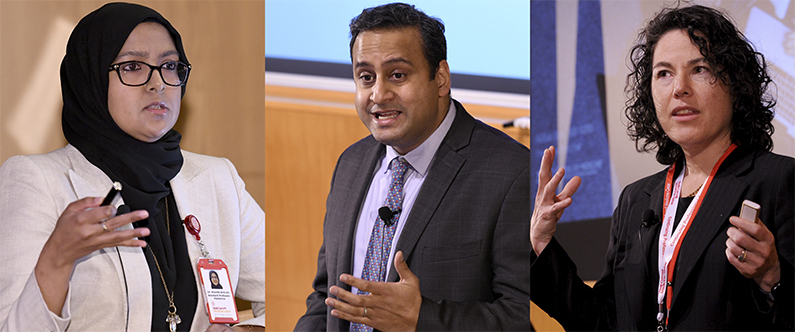Three experts present at WCM-Q Grand Rounds
 From left: Dr. Reshma Bholah, Dr. Saumil Parikh and Dr. Gillian Baty spoke at WCM-Q Grand Rounds.
From left: Dr. Reshma Bholah, Dr. Saumil Parikh and Dr. Gillian Baty spoke at WCM-Q Grand Rounds.
Three leading experts in their respective fields of medicine spoke at Weill Cornell Medicine-Qatar’s (WCM-Q) Grand Rounds to discuss disorders of the kidneys and urinary tract, airway management and the role of ultrasound in medical education.
Dr. Reshma Bholah, assistant professor of medicine at WCM-Q, gave a presentation titled ‘Overview of Congenital Anomalies of the Kidney and Urinary Tract (CAKUT)’, in which she outlined the methodology for postnatal evaluation of patients with CAKUT, described associated urological issues and the clinical course of CAKUT, and outlined the challenges of transitioning from pediatric to adult care. Dr. Bholah is a graduate of WCM-Q (Class of 2011) who returned to join the faculty at the college in 2018, having completed her pediatrics residency training and sub-specialty training in pediatric nephrology at Virginia Commonwealth University in Richmond, Virginia.
Visiting expert Dr. Saumil Parikh, clinical instructor of emergency medicine at Weill Cornell Medicine in New York, spoke on the subject of ‘Current Trends in Airway Management – Minimizing Peri-intubation Hypoxemia by Optimizing Preoxygenation. Dr. Parikh appraised the current literature relating to preoxygenation during endotracheal intubation, discussed the effectiveness of various preoxygenation modalities and analyzed how delayed sequence intubation (DSI) can be utilized to optimize success in first-pass intubation. DSI makes use of an anesthetic, usually Ketamine, to calm a patient and facilitate safe intubation. Referencing a 2014 study, Dr. Parikh said: “The study looked at 62 patients and mapped where their oxygenation started, then they gave them DSI and looked at where their oxygenation ended up and it shows clearly that DSI really does help hypoxic [oxygen deprived] patients. So, 52 percent got no DSI and they remained hypoxic, whereas only five percent who got DSI remained hypoxic.”
Dr. Gillian Baty, residency program director in the Department of Emergency Medicine at the University of New Mexico, gave a presentation titled ‘Leading the Way with Clinical Ultrasound in Undergraduate Medical Education’. The presentation included an account of the progress of incorporating ultrasound education into undergraduate medical education in the US and a comparison with the corresponding situation in Qatar. Dr. Baty then discussed the future direction for ultrasound education in both countries.
Dr. Parikh and Dr. Baty delivered their Grand Rounds lectures while in Qatar as part of the WCM-Q Visiting Professorship Program. All three lectures were accredited locally by the Qatar Council for Healthcare Practitioners-Accreditation Department (QCHP-AD) and internationally by the Accreditation Council for Continuing Medical Education (ACCME).